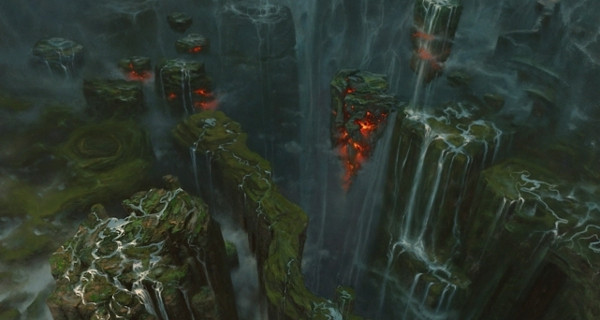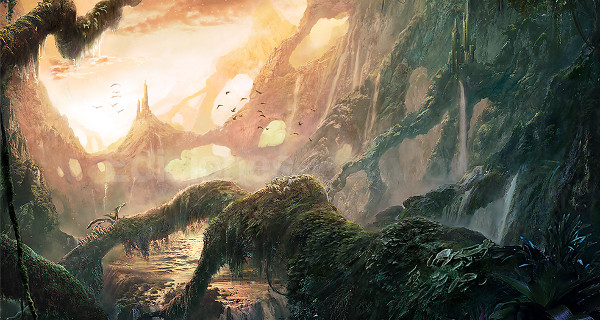One of the first new posts I'd like to write on this old blog of mine, is of a type I posted a lot in the past: a rant! Oh yes: I got older, so if anything I rant more, not less... And while before I was mainly ranting about details I didn't quite like here and there in the game, nowadays I find myself rather seriously disappointed by the direction that D&D took, design-wise.
The cost of success?
During the times of 4e there was talk of "D&D being dumbed down", especially around the time the so-called Essentials books came out. The then new and radically different 4e was accused of wanting to cater to the masses that were playing videogames, making the game dumb like one.
But I think it's clear to everyone now that the version that really dumbed down D&D is the 5th.
Sure, the edition is a big success, and it's in part responsible for this big renaissance of D&D and pen & paper RPGs, that the world is living right now. (I think Stranger Things has a much larger share of this responsibility, but alas, this is all speculation anyways.)
But see, this is the point: D&D became a game for the masses, which basically by definition means it has been dumbed down. I'm not playing elitist here: I love to see my favorite game accessible and liked by more and more people. My point is this had a cost: now I don't like it as much as before.
Of forgotten (or ditched) ideals.
When 5e was in the making, the famous #dndnext you see named all over the place in this blog, back when I was one of the official alpha-testers of the game, it was exciting: a lot of new and radical ideas were being considered, and there was this feeling that we were going to have a super-simplified rules-set first, but that later on an advanced one would have surfaced, being totally compatible with the simplified one, but catering to the players that enjoy complexity, like me.
This never happened.
While there are here and there, even nowadays, some efforts to do this (recently Variant Class Features, or the Mystic class, which seeing recent tweets by the designers and the direction taken to represent psionics, I am about to consider dead in the water), the impression is that designers got blinded by the gold of the good sales, and just thought "Hey, we don't need no complexity: just do more of the same!" While simplicity has its virtues, and more options actually do add a bit of complexity in that they make every choice a little bit harder, there is really a big lack of complexity at the core of the game, and I can very easily identify where it lies.
The (forgotten) magic word is: modularity.
Modularity was all the rage during the development of 5e, in the dndnext times. It seemed like the game was going to become something that you could customize however you wanted, down to the core.
You can see a fossil of this long-lost gamelogical era in Feats, in 5e: they are optional, and if you choose to play with less complexity (yes, even less!) you can exclude them and just get ability score modifiers. Now, not only this is the only piece of modular design left, but it's a bad one to boot: many of the feats, or at least many of the first ones which are STILL the majority (because very few others were released), don't provide ability score bonuses, making you ache like crazy when choosing to go for them, even if they add flavorful concepts that sometimes define the characters, given how "big" they are, in design space, compared to 4e or even 3e feats.
The cool idea of skill dice? It could have been modular, replacing proficiency bonuses. But nothing, it got lost. And what about granular skill improvement, 3e-style? It could have been another modular piece, without losing anything, but again, no luck. Same examples could be made about many many mechanics: the math of 5e is solid, so there could be many ways to dance around the same balance level but moving stuff around, or increasing the amount of "choice points" in character creation, or class feature usage, or more.
But the great sin is my usual pet peeve: class identity
The examples above are just details. The big losses in my opinion are in the way classes and spells were designed. By wanting all the classes and "traditional spells" in the first book (a clear message, going against one of the big whining wars against D&D 4e), 5th edition cornered itself in a very bad spot when it comes to class identity: whatever they released as Ranger should have been the Rangers for years to come. Same for Warlock, Sorcerer, Paladin, etc.
The few of you who know this blog, know that I played the part of the "lathspell" in this, many times. And guess what: it all came to pass as predicted. The problem with hybrid classes was never solved, with Ranger seeming just a jumble of Rogue, Fighter and Druid in a single package, and the problem of Vancian magic used to represent everything was also just accepted by the majority, probably as another design-middle-finger against 4th edition, which had dared kill this sacred cow.
So the problem runs deep. While designers acknowledged the fact that some classes (and in particular the Ranger, as I always always warned) "fell flat" compared to others, their abandonment of modularity as a key concept of the game made it very hard to correct the mistake. Even when they announced they COULD have (they still didn't) release a revised Ranger, they always said this would have been an optional alternative, not a true revision. And of course it would be, because the way classes are designed, you can't do much else. For all its reputation of being monolithic and hard to modify, 4e was much more modular in comparison, with powers potentially changing a class without even having to modify a single bit of it. Not to mention how the whole system of AEDU could be changed into AADU, or AEU, changing the game as we knew it, as shown by Psionics and Essentials. What can still have the same effect on 5e? Spells. But that's another can of worms, because as I said, part of the issue of class identity is represented by spell design.
From everything is a power to everything is a spell
One of the latest ways in which designers tried to save some classes (and the interest of players like me for the game, I guess) was by giving them more access to more spells.
In the problematic case of the Ranger, it was free access to Hunter's Mark (a spell with VOCAL components, mind you), as a replacement of the trainwreck class feature "Favored Enemy". This would replace it imaginatively with "Favored Foe". Where to begin in explaining how wrong this is?
- A ranger casting spells with vocal components is extremely contrary to the class identity of "silent and lethal woodland warrior". Can you imagine Rambo chanting magic words to be do more damage to an enemy? Ok, Rambo might be a bit of a bad example (although to me he is the most iconic ranger), but you can see this with any elf archer usually represented as a ranger, or Aragorn, or Drizzt, or anybody. It's just plain silly.
- It tries to go back to the previous philosophy of 4e of "everything is a power", which could be a solution, but changing powers to spells means we are shoehorning them into daily vancian slots, assigning them somatic/vocal/material componenets, and giving mundane abilities a mystical flavor that they shouldn't have.
- It's an attempt of driving attention away from the flaws of the system, and of classes, which in the cae of the Ranger are much deeper.
- Thinking that different systems are inherently harder to learn than a single one.
- Thinking that different magic systems try to accomplish the same thing: magic.
- I like how, system flaws aside, classes have actually much more identity in 4e. It had a Ranger that without spells managed to be truly different compared to the Fighter and (to a lesser extent) the Rogue, and the same for other classes, especially when you consider how much they evolved (with less being more, as per the 5e design philosophy) in 4e Essentials.
I would seriously play 4e classes with 5e math (mainly Hit Points), and be much happier, BUT: - I like many non-combat features of classes in 5e. The thing is: they compete for space with the combat stuff. Solution? Take them out of the classes and put them where they belong: Backgrounds! Backgrounds should be more like classes, in that they should evolve in time, level up so to speak. Heck, one should even be able to "multi-background", because it's frankly silly to think that a couple of years in the army would count so much for the character that decades of adventuring wouldn't change the character's mindset from the "Soldier background".
- I would redesign completely the Ranger, the Sorcerer, the Warlock, and perhaps also the Rogue (since so many of its features would go into the Criminal background), and the Paladin.
Sorcerer would get on-the-fly magical effect creation, and Warlock would return to using powers that are more than just spell-like, they are supernatural. Paladin and Ranger would borrow a thing or two from the Tome of Battle, Mike Mearls true forgotten masterpiece, in 3rd edition times. - Advantage and Disadvantage are nice and all, but they can't be used for every damn thing. I feel like randomness has way too much weight on the game's math. Advantage and Disadvantage should, if anything, stack (roll 3 or 4 dice, take best or worst), and/or be accompanied by other bonuses, such as skill dice, proficiency bonus, and also a return of additional modifiers which could be standardized to +2, maybe.
- Skills should be much more important and feel like they develop more in time. This proficient/non-proficient dichotomy is boring as hell, and just doesn't do justice to how much time and effort it takes to become really good at something. Expertise kind of solves this, but guess what, all my characters dip into the Rogue class just for this. You know the system is wrong when you have to multiclass all over the place to represent something that shouldn't require it.
- I would welcome back Themes of 4e with open arms, and make them marry Backgrounds of 5e. With a big difference: the features and powers they would offer would not compete with class, but be totally parallel and in addition to it. If anything, they would compete with other Backgrounds-Themes the character might want
- Quite the same for Race: it should matter more. It should basically provide a standard background for those that don't want to think about a Background-Theme, and allow those that want a Background-Theme to choose if to develop more towards the default of their race or their Background-Theme, at every level, and not only: these are features that could even be swapped in-level with the right story.
- I would have Arcane magic split into Wizardry, Sorcery (with this split into elementalism and chaos sorcery), and Witchery or Eldritch Magic for Warlocks. All of them using different systems.
- I would do Psionics justice with another separate system, and powers that feel really different compared to magic, much closer to the abilities of martial characters and monks. In fact, I might even have the Monk be the first Psionic class, like in 4e.
- All of this, and everything else should follow a single design principle: modularity.
















0 comments:
Post a Comment